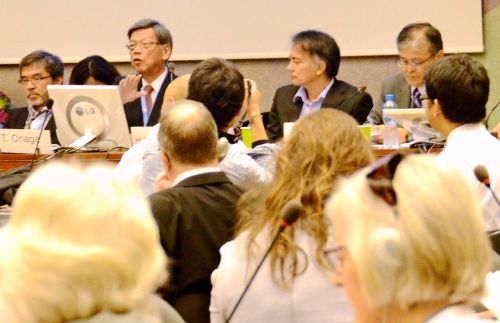Historical Highlights of Okinawa’s Hardships, Debating Base Issues at UN Symposium

September 22, 2015 Ryukyu Shimpo Ryota Shimabukuro reports from Geneva
On the morning of September 21, the symposium Militarization and Human Rights Violations in Okinawa opened at the United Nations European Headquarters in Geneva, Switzerland. Governor Onaga spoke first at the symposium for about 20 minutes, mentioning that Okinawa was once an independent nation before its annexation by Japan. Now, after the Battle of Okinawa that claimed 200,000 victims, looking back on the 70-year span of an overwhelming base burden on Okinawa, he claims that Okinawan people’s freedom, equality, human rights, democracy, and right of self-determination are being disregarded.
The symposium was jointly hosted by Shimin Gaiko Centre (Citizens’ Diplomatic Centre for the Rights of Indigenous Peoples), the International Movement Against All Forms of Discrimination and Racism (IMADR), and the Shima Gurumi Association, among others. The issues of carrying out construction of the new base in Henoko were discussed through the lens of human rights, the environment, and other such aspects.
Co-representative of Citizens’ Network for Biodiversity in Okinawa, Hideki Yoshikawa, said that the process of conducting environmental impact assessments of the new base construction has been harshly criticized by experts as “the worst in Japan’s history,” among other such critiques. He said he wishes for scientists and experts around the world to investigate the impact that new base construction will have on the people and environment of Okinawa.
Hideaki Uemura, president of Shimin Gaiko Centre, introduced particulars about the United States’ tie to the Ryukyu Kingdom by the Treaty of Amity, its silence over Japan’s annexation of the Ryukyu Islands, and Okinawa’s militarization under direct U.S. control after the Battle of Okinawa. He presented that after Okinawa’s return to Japan, the U.S. expanded and strengthened its bases in Okinawa, meanwhile allowing its actions to fall under the shadow of the Government of Japan. Liability for Okinawa’s situation also falls heavily on the U.S., Uemura attested.
Yoshikazu Shiohira, Chief Editor of Ryukyu Shimpo, reported that cases have been occurring in which city residents protesting construction of the new base come to be in scuffles with and are arrested by police. Reflecting on another case in which a coast guard officer overreached his duty and restrained a citizen by straddling her, he said these behaviors undermine freedom of expression, freedom of assembly, and freedom of the press. He asserted that as Okinawan people do not condone new base construction, the construction should certainly be ceased.
(English translation by T&CT and Erin Jones)
Previous Article:Gov. Onaga gives speech at UN calling for stop to US Henoko base construction
Next Article:Berkeley City Assembly resolves to oppose new base construction in Henoko
[Similar Articles]
- NGO Human Rights Now criticizes Japanese government for blocking protesters in Henoko and Takae
- Yamashiro to address infringements on Okinawans’ rights at UN Human Rights Council in June
- In UN speech, Hiroji Yamashiro calls out Japanese government human rights violations in Okinawa
- Professor Matsushima makes a statement at the U.N. demanding universities return Okinawan ancestral remains
- Editorial: UN special rapporteur indicates freedom of expression in Japan in danger; infringing on freedom of expression is inexcusable
 Webcam(Kokusai Street)
Webcam(Kokusai Street)


